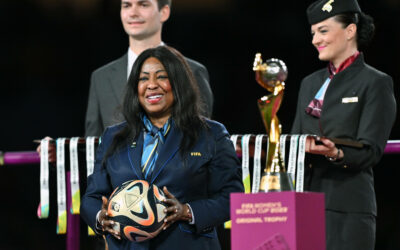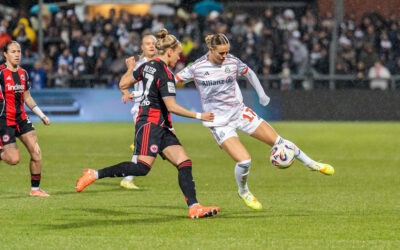Ahead of the UEFA Women’s Champions League final in Lisbon, the most influential voices in women’s football came together to discuss the game’s future.

With Lisbon’s botanical gardens as the backdrop, key stakeholders gathered for the fourth edition of the UEFA Business Case for Women’s Football event.
Through dedicated sessions and panels, the occasion showcased how clubs, leagues, sponsors and players are driving the women’s game forward.
The key message was clear. Women’s football in Europe is being shaped by dedicated and intentional strategy, structure and collective ambition.
“Women’s football is gaining strength rapidly – progress that is both measurable and accelerating. But just like in training, there are phases where disciplined repetition and recovery are crucial to long-term performance. Growth isn’t just about speed. It is about building endurance and resilience needed for the road ahead.” – Nadine Kessler, Managing Director UEFA Women‘s Football
Clubs benefitting from strategic planning
After a welcome from UEFA deputy general secretary and director of football Giorgio Marchetti and managing director of women’s football Nadine Kessler, the first panel of the day got underway, focusing on the sporting outcomes of deliberate planning and investment from a club perspective.
Attendees heard from SC Braga president António Salvador, Sporting CP president Frederico Varandas, Brighton & Hove Albion FC CEO and deputy chairman Paul Barber, and Rangers FC CEO Patrick Stewart.
The panel demonstrated how long-term investment in infrastructure, staffing and fan engagement is paying off.
Clubs are growing matchday and merchandise revenue – resulting in an 187% increase in revenue for clubs in the top leagues over the past four seasons – while improving on-pitch performance through youth development and smart spending in an evolving transfer market.
Clubs that commit to deliberate planning are building a competitive advantage for the future. Structure and strategy – not just spending – are proving to be real drivers of success.
“We’re thinking about women’s football in a different way, because even though it’s the same sport, it’s got different opportunities. We see this as having a long-term benefit for the club, both on and off the field.
“By prioritising female athletes first, making sure they are at the centre of our business case for our new purpose-built stadium, then in the long term we’ll have an overall business case for women’s football to be sustainable and profitable.” – Paul Barber, Brighton & Hove Albion CEO and Deputy Chairman
Players driving future direction of women’s football
Bayern München and Sweden defender Magdalena Eriksson joined recently retired Italian international Sara Gama for a fascinating panel on the professionalisation journey from the players’ perspective.
They highlighted how players are benefitting from longer contracts, salary increases, safeguarding and support systems, while also having a growing role in shaping policy and connecting with fans.
Players are at the heart of women’s football as it grows, with their visibility and leadership central to the game’s commercial and cultural rise.
“These policies are so important. They help the players stay in the game. That’s what we want – the best players to stay in the game for as long as possible, with the best circumstances around them.
“During the last national team camp, we had our first mother who brought her baby – Amanda Ilestedt. This is the future. It brought us joy, but it also meant we could have Amanda, one of the best centre-backs in the world, at our camp.” – Magdalena Eriksson, Sweden and FC Bayern Munich Defender

Sponsors shaping game’s identity
The third session began with an insightful keynote speech from Two Circles managing director Annie Panter, who highlighted the importance of growing the number of avid women’s football fans.
This was followed by a panel on how sponsors can build effective fan engagement strategies by understanding audiences. On hosting duties was former Austrian international Viktoria Schnaderbeck, who captained her country during their run to the Women’s EURO 2017 semi-finals.
She was joined by FC Bayern women’s football director Bianca Rech, Serie A head of women’s football Francesca Sanzone, Annie Panter and VISA Sponsorship Marketing women’s football lead Liesel Jolly.
Sponsors are active partners in the women’s football ecosystem, shaping the game’s identity and building meaningful connections with values-driven audiences.
The discussion underscored the need for campaigns that resonate authentically with women’s football fans, with the relationship between sponsors, leagues, players and clubs central to bringing authenticity and purpose.
The ultimate takeaway: that sponsorship in the women’s game must be about meaningful partnerships, not just exposure.
“Fans of women’s football associate the game with positive values – inclusion, empowerment, authenticity. This is an opportunity for sponsors and partners. We know how important players are in this too – whenever we approach a partner or potential sponsor, they immediately ask for player involvement. Any kind of message is spread in a powerful way when it’s the player giving it.” – Francesca Sanzone, Serie A Head of Women‘s Football
Leagues accelerating professionalisation of the women’s game
Sofia Teles, the director and head of women’s football at the Portuguese Football Federation, led a panel centred on league development.
She was joined by Women’s Super League Football CEO Nikki Doucet, Ligue féminine de football professionnel vice-president Andreea Koenig, and UEFA Executive Committee member and Norwegian Football Federation president, Lise Klaveness.
The panel highlighted how leagues are growing revenues by expanding media coverage, deepening sponsorship and investing in infrastructure. This has seen a 146% increase in average revenues among the top leagues over the past four seasons.
Broadcasting strategy is seen as the key to this, with free and digital platforms helping to attract new audiences.
The discussion reinforced that league-level planning and investment are essential to the long-term success of the women’s game, setting the stage for continued growth.
“Having a very competitive league is a major objective. It goes hand in hand with bringing people to the stadium. The more people come to witness the jeopardy, the more broadcasters are interested. It’s crucial our league becomes more competitive and we’re all working towards this.” – Andreea Koenig, Ligue Féminine de Football Professionnel Vice-President



